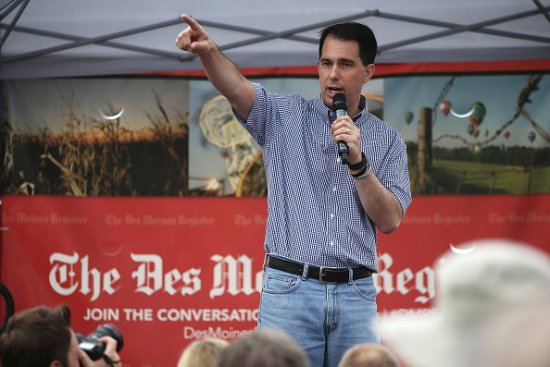
When Scott Walker launched his campaign for the Republican nomination in July, he said that his first goal would be to repeal Obamacare. On Tuesday, the Wisconsin Governor detailed what he’d do next, and it sounds familiar.
In a speech in the neighboring state of Minnesota, Walker outlined a plan for overhauling America’s healthcare system that draws on the broad principles behind the Affordable Care Act.
There are differences in specifics: the insurance exchanges are now called pools, where small businesses can band together to buy coverage for employees; young adults can stay on their parents’ plans but only if states OK it; and Americans without job-based insurance would qualify for government subsidies based on age instead of income.
And there are some conservative ideas in the mix too: states would run more of the program, insurance regulations would be scaled back or scrapped and medical malpractice lawsuits would be limited.
[time-brightcove not-tgx=”true”]But overall, the plan reflects a reluctant realization that there are few alternatives to fix many of the problems that Obamacare addressed and that after two Supreme Court decisions, a presidential election and two midterms, the law will be hard to completely upend.
That’s not to say that Walkercare is Obamacare Light.
“On paper, it certainly does provide protections. There are just some holes,” said Larry Levitt, a senior vice president at the non-partisan Kaiser Family Foundation, which has studied the law extensively. If enacted with as little as oversight as outlined, Walker’s plan would likely lead to coverage at levels even lower than pre-Obamacare. “At the talking point level, Governor Walker’s plan sounds an awful lot like Obamacare,” Levitt said. Look a bit deeper, though, and “there are some big differences.”
For instance, the popular prohibition against denying coverage to individuals with chronic conditions such as cancer only is in place if the patient had maintained continuous insurance. Those who let their insurance policies lapse are potentially locked out of private coverage for life. Separately, pricing discrepancies between genders and ages could return. The extremely poor would still have access to health coverage, although it would not meet the current standards. There are no limits to out-of-pocket health costs, although Walker would allow Americans to set aside more money for their own health care tax-free.
Yet Walker includes some of Obamacare’s most popular provisions, such as guaranteeing access to health insurance to all Americans. “In the very broad brushstrokes, that’s also what Governor Walker’s plan does. The similarities end there,” said Topher Spiro, a former Capitol Hill senior aide who helped lawmakers write Obamacare.
For instance, older and poorer Americans would be treated less fairly under Walkercare than under Obamacare. Tax credits would be even for all Americans, regardless of income; that benefits wealthier Americans who don’t need the help. “If you’re making $150,000, you’re getting the tax credit. It’s not very efficient. It’s very wasteful,” said Spiro, now at the liberal Center for American Progress.
Democrats were fast to criticize the proposal. “Thanks to the Affordable Care Act, 16 million Americans have gained health insurance, the uninsured rate is at its lowest point ever recorded, health spending grew at the slowest rate in 50 years, all while we’ve had 65 months of consecutive private sector job growth,” Democratic National Committee spokesman Eric Walker said. “This law saves money and lives, but Republicans’ only plan is repeal.”
The plan also drew criticism from one conservative rival. Louisiana Governor Bobby Jindal, badly trailing in the polls, called Walker’s subsidies a “new entitlement program.” “It is frankly shocking that a Republican candidate for President would author a cradle-to-grave plan like this,” Jindal said in Iowa.
Perhaps most problematic, however, is that Walker’s plan ignores the political realities. Repealing Obamacare requires votes from both chambers of Congress and a President’s signature. Under the current rules, it would take 60 votes in the Senate to get past a key procedural hurdle. Republicans currently only have 54 Senators and the 2016 map is no cakewalk for the GOP.
Then, there is the actual legislating. Walker’s replacement plan would require states to pick up the slack, but state Legislatures do not meet year-round and there’s no guarantee that even Republican-led statehouses would rush to set up a healthcare system based on Washington’s offers.
“If the federal government put the responsibility for regulating insurance and creating new programs back on the states, it would take time to put those in place. Every state Legislature would have to go through a debate about what kinds of rules they wanted in the insurance market,” Levitt said. “We’re talking about several years, even if the law based on this plan were to pass.”
Walker’s plan also is likely to face opposition from the healthcare industry. After years of preparation and adjustments to comply with Obamacare, yet another fundamental shift is hardly one they—and their shareholders—are going to embrace. Most rewrote policies to comply with the new mandates.
Then, there are the actual consumers. The Urban Institute estimated that roughly 2.6 million Americans had to switch health plans to shift onto Obamacare-compliant policies. In many cases, they were most costly but also more comprehensive. A few consumers would want cheaper plans, but fewer would want to go back to plans that lacked serious coverage or protections. Asking Americans to give up existing benefits, whether it is a prescription plan or Social Security, is never a political winner.
Half of Americans disapprove of the Affordable Care Act, while only 44 percent approve, according to the most recent Gallup survey. But there’s a big distance between disliking a law and agreeing on what should replace it.
See the 2016 Candidates’ Campaign Launches


















